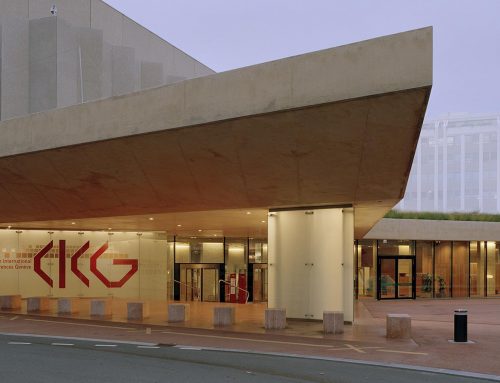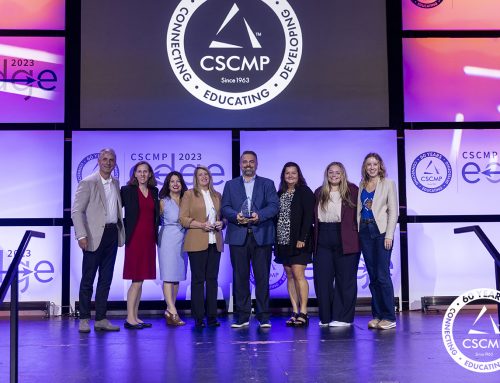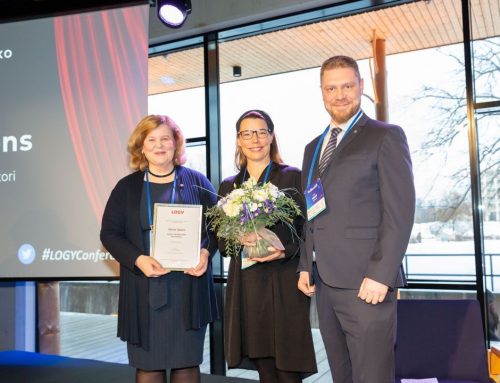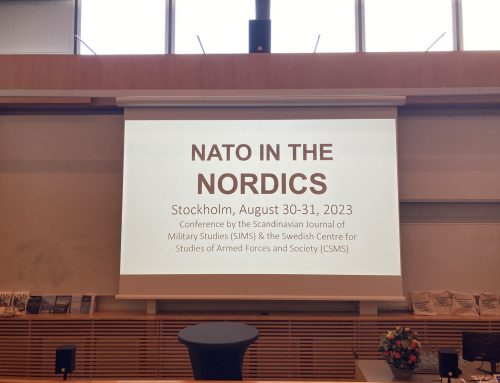Last year marked the beginning of operational and formalised cooperation between the three research institutes at Hanken, CCR, GODESS and HUMLOG. The institutes decided to put into practice an idea, which is often preached in academia but not implemented as often: collaboration.
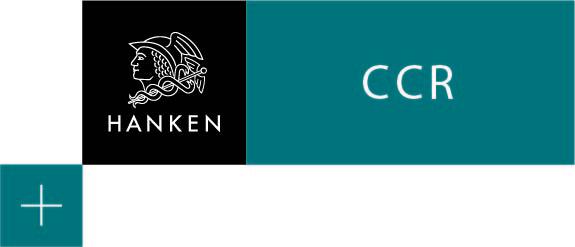

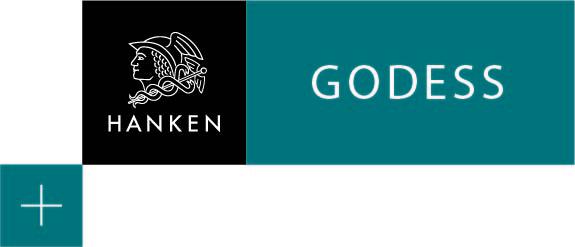
This collaboration was possible because the three research institutes share most of their fundamental values (not to forget multiple meetings throughout the year):
- First, they all value cross-disciplinary research. “Interdisciplinary research moves beyond simple collaboration and teaming to integrate data, methodologies, perspectives, and concepts from multiple disciplines in order to advance fundamental understanding or to solve real world problems.” Trewhella (2009)
- Second, they share similar purposes. The vision of the institutes is to try to make the world a better and sustainable place, by working towards providing aid to persons requiring humanitarian assistance (HUMLOG), by enhancing the understanding of the interactions between business, politics, and society – particularly in relation to the societal impacts and responsibilities of business (CCR), and through increasing the awareness on gender, diversity, equality, and social sustainability (GODESS).
- Finally, they all want to engage with societal issues through multi-stakeholder dialogue involving government, businesses, civil society organisations, students, and society more broadly speaking. As research institutes, they share the goal of real social impact which reaches beyond the realm of academia.
This collaboration was formalised via mainly two events:
- The Responsible Organising conference, which took place on November 13 at Hanken.
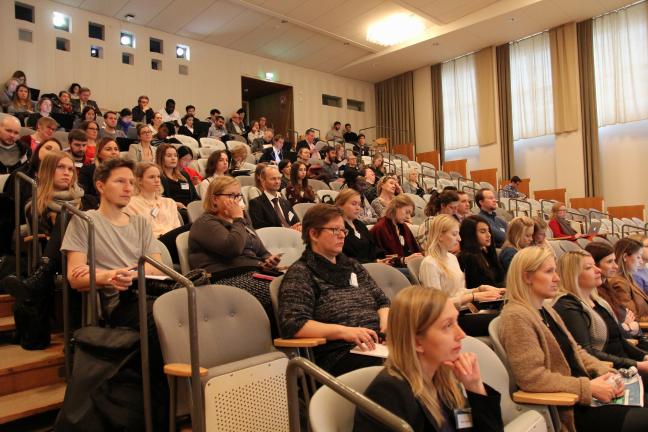 The purpose was to create a space for actors who want to collaboratively explore how to mobilise and organise to achieve social impact. 122 participants joined the discussions.
The purpose was to create a space for actors who want to collaboratively explore how to mobilise and organise to achieve social impact. 122 participants joined the discussions.
The day was composed of presentations from keynote speakers, a panel discussion with the audience and three parallel workshops.
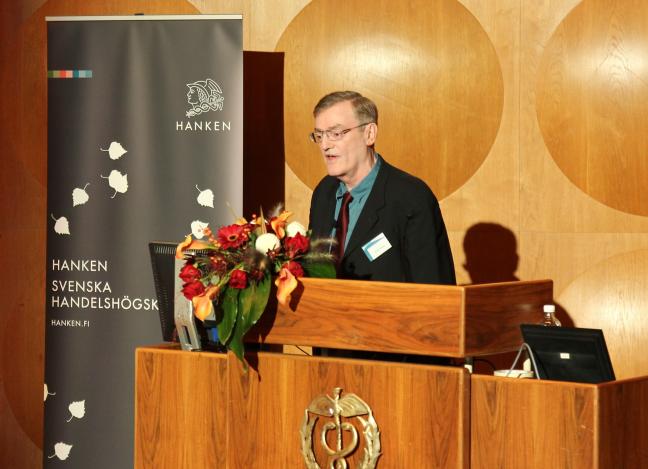 Supply Chain Management and Social Responsibility (Hanken) to talk about “Gender Inequality and Responsible Humanitarian Response”. The HUMLOG workshop ”A paradigm shift in humanitarian aid? New approaches in organising humanitarian response” was conducted by Katri Meriläinen, Head of Educational Development at Lyfta and Jussi Impiö, Leader of FOCCA project at Demos Helsinki.
Supply Chain Management and Social Responsibility (Hanken) to talk about “Gender Inequality and Responsible Humanitarian Response”. The HUMLOG workshop ”A paradigm shift in humanitarian aid? New approaches in organising humanitarian response” was conducted by Katri Meriläinen, Head of Educational Development at Lyfta and Jussi Impiö, Leader of FOCCA project at Demos Helsinki.The members of the organising committee, consisting of representatives from all the research institutes, tried to be responsible themselves and constantly took into account sustainability in how they arranged the event. To them, being responsible is also about what to do with all the knowledge, material and ideas that get created during the conference. They decided to document them, and share them via short videos. A first “Behind the scenes” video has been edited to showcase the organizers behind this conference and how this idea of taking the discussion of responsible organising down to a concrete level came up. Watch this video here!
For more info about this conference, visit: https://www.hanken.fi/en/node/1413958
- The series of collaborative and crossdisciplinary seminars “What do you think?”, of which there have been two until now, on October 16 and December 11.
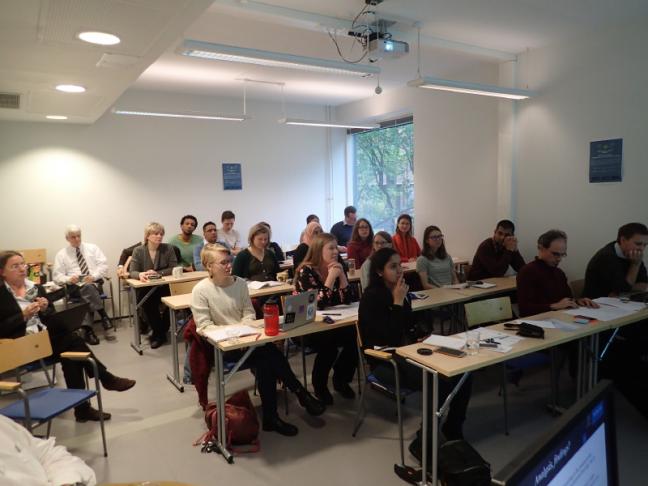 The seminars, arranged once every second month, consist of three presentations of around 10 minutes each, each followed by discussion of around 20 minutes. The purpose of these seminars is to offer a platform mainly to present research ideas (from very preliminary ones to first drafts of full papers), but also to exchange on other research-relevant topics, such as interests or project funding opportunities related to the topic areas of the three research centres. The atmosphere is relaxed, positive and casual so that constructive and open discussions are facilitated. Presenters are encouraged to present early-stage research in order to receive some valuable feedback and encouragement. Between 20 and 30 participants took part in each seminar until now. More info about the seminars can be found here.
The seminars, arranged once every second month, consist of three presentations of around 10 minutes each, each followed by discussion of around 20 minutes. The purpose of these seminars is to offer a platform mainly to present research ideas (from very preliminary ones to first drafts of full papers), but also to exchange on other research-relevant topics, such as interests or project funding opportunities related to the topic areas of the three research centres. The atmosphere is relaxed, positive and casual so that constructive and open discussions are facilitated. Presenters are encouraged to present early-stage research in order to receive some valuable feedback and encouragement. Between 20 and 30 participants took part in each seminar until now. More info about the seminars can be found here.The collaboration will continue in 2018, through various projects and events, which need further deliberation through more meetings. Some more digital content will be created from the footage captured around the Responsible Organising conference and will be shared in the spring 2018. Stay tuned to be aware of the latest updates on the matter!
Ref:
Trewhella, J. (2009) Multidisciplinary research – an essential driver for innovation. Available at https://globalhighered.wordpress.com/2009/06/26/multidisciplinary-research-an-essential-driver-for-innovation/

